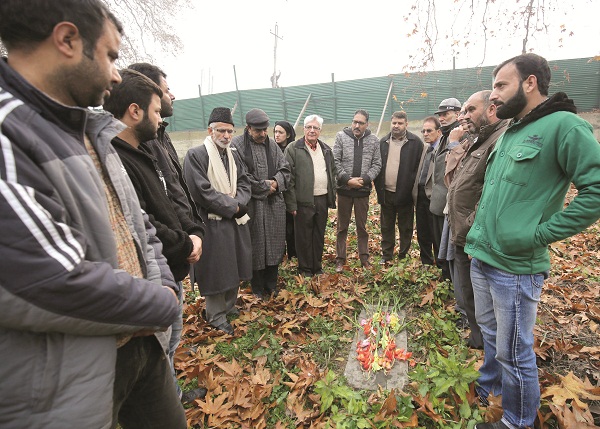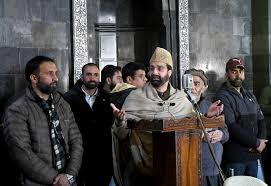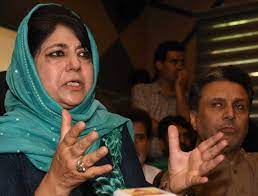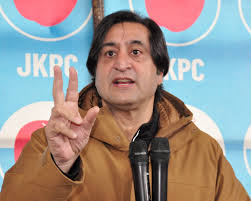Members of civil society Sunday paid glowing tributes to Robert Thorpe on his 147th death anniversary.
A delegation of civil society members, led by Dr Altaf Hussain, visited Thorpe’s grave situated at Sheikh Bagh near Mallinson School.
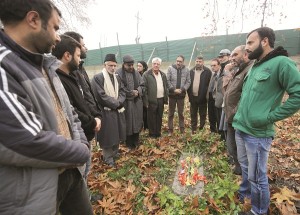 The delegation members included Zareef Ahmad Zareef, Abdul Majid Zargar, Dr Shujaat Bukhari, Parvez Imroz, Khurram Parvez, Ahsan Untoo and Showkat Ahmad.
The delegation members included Zareef Ahmad Zareef, Abdul Majid Zargar, Dr Shujaat Bukhari, Parvez Imroz, Khurram Parvez, Ahsan Untoo and Showkat Ahmad.Speaking on the occasion, the members highlighted the contribution of the “unsung hero”.
Dr Altaf stressed on the need to inform people, particularly the young generation, about Thorpe’s contribution.
Senior journalist, Zaheer ud Din said Thorpe sacrificed his life for the better future of Kashmiris. “He was among the first martyrs of Kashmir as he raised his voice against Maharaja’s tyrannical rule in Kashmir,” he said.
Dr Shujaat Bukhari said the sacrifices of Robert Thorpe shouldn’t go waste. “He has showed us how Kashmiris suffered and struggled since ages and how much Kashmiris are suffering for centuries,” he said.
On the occasion, the members pledged to rededicate their lives for the cause of Kashmir for which Thorpe gave his life.
“We will decide a day to remember Robert Thorpe’s contribution. A committee will be formed in this regard to decide the future strategy,” said Khurram Parvez.
WHO WAS ROBERT THORPE?
Robert Thorpe, a young British Army officer, arrived in Kashmir as a tourist in 1865.
Thorpe’s mother, Jana was a Kashmiri and lived with her family at Sugen Yarinar in Budgam district. Thorpe’s father was an officer in the British army and would come to Jana’s village very often. One day when Jana was herding her buffaloes, Thorpe saw her. He fell in love with her. Jana belonged to an orthodox Muslim family and Thorpe knew the affair would not mature into a lasting relationship unless he embraced Islam. Jana’s relative, Habibullah Teli was a soldier in the British army. Thorpe approached Teli. He consented to their marriage. After some time Robert Thorpe was born.
Robert Thorpe had heard stories about Kashmir’s beauty and the suffering of its people from his mother Jana. He was desperate to visit Kashmir.
In 1865, when Thorpe visited Kashmir, foreigners required permission of the British authorities. They could not stay in the Valley for more than two months. Twenty-seven-year-old Thorpe stayed longer to study the appalling condition of the people of his mother’s birthplace.
Thorpe was shocked to see the miserable plight of the people in his mother’s birthplace. He raised his voice at the time when there was total sanction on information reaching the government of India. Thorpe took it on himself to inform and educate the British people about the situation in Kashmir by writing to the British Press without caring for consequences. Thorpe felt the British were responsible for the plight of Kashmiris, as it was they who had sold it to the Maharaja under the “Treaty of Amritsar.”
Thorpe travelled across Kashmir collecting information about the plight of the people and thoroughly investigating the facts. He later on published a book entitled “Kashmir Misgovernment” and dedicated it to the people who, according to him “do not approve of cruelties upon human beings, and to those who are exalted from the moral, religious and social point of view and do not like oppression”.
Thorpe pleaded that British government had committed a wanton outrage and injustice by handing over Kashmir to the unjust Maharaja.
However, trouble came upon Thorpe and he was ordered to leave Kashmir. Undeterred, Thorpe returned to Srinagar on November 21, 1868, and next morning after his breakfast he died, possibly because of poisoning. Thorpe was found dead on the Suleiman Taing hill. (Inputs from Zaheer ud Din)

